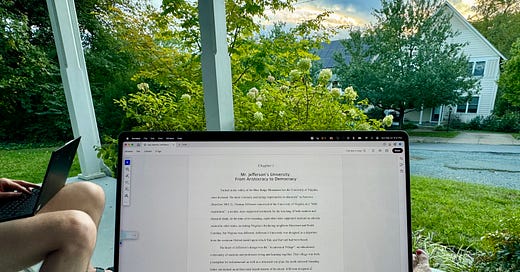A quick dispatch from this quiet Charlottesville porch at magic hour—thanks, Abby!—where I’m forcing myself to reread my college thesis for the first time in decades.
Credit to my beloved anthro thesis advisors who nurtured my multi-year oral history project masquerading as ethnography. “Legitimizing Gay Identity at the University of Virginia 1972-1992” should have emerged from the History department, but thankfully, sociocultural anthropologists live to problematize categorization. Thank you for the guidance and grace, Professor Susan McKinnon and Professor Richard Handler.
Down here with my college bestie John (aka my platonic plus one for life) for the 25th annual Queer Virginia Alumni fall weekend. A huge chronological milestone! Especially when I remind myself that I attended the first one as a student. Gulp. Time sure has flown by.
**
I arrived at UVA in the fall of 1998 with mixed emotions. All my excitement for college life was blunted by the reality that I was living in central Virginia. After spending my high school years as an LGBT youth and family activist in the DC area, matriculating at UVA felt like stepping backward in time. I was supposed to be moving to California, not Charlottesville.
To survive, maybe even find a way to thrive, I dedicated my college years to making the University a more welcoming place for queer students. It felt righteous then, though now I see how it was also selfish. I needed to make room for me.
As I recapped in the paper’s intro:
It is impossible to introduce this project without talking about my own development at the University of Virginia. Coming to the school as a first-year, I worried how I, a queer identified woman, would fit into the University created by and for “Virginia Gentlemen.” Here was a school that I perceived to be the bastion of all things Southern and conservative (as if there were a distinction). I knew that the University had only become co-educational in the last thirty years and only integrated a few years before that. I couldn’t imagine how lesbian, gay, bisexual and transgender (LGBT) people might fare in this climate now, let alone in years past.
This thesis is just one manifestation of a larger project that began in 1998, when as an officer of the Lesbian, Gay, Bisexual and Transgender Union (LGBTU), I stumbled upon some boxes of archives from the organization’s predecessor the Gay Student Union (GSU)….On a grand scale, the documentation project attempts to trace the development of LGBT people at the University by collecting not just physical archival material (photographs, newspapers, notes) but also stories and oral histories in order to create a repository of memory.
Hello, former self! Is reading one’s college thesis the long-form equivalent of thumbing through an old yearbook? My sentences are full of adolescent blemishes. But also, there’s so much heart and good intentions. The paper remains, by far, my longest piece of writing—17k words! And it is awash with earnest 22-year-old assertions:
The term community is a complicated and contested term referring to a given set of understandings and assumptions about the associations of a given set of people. Rather than attempting to define a singular “community” within the University, this project focuses on the intersections between University institution and the emergence of self-identified gay and lesbian students.
Off to wince through the rest of the 60+ pages.
xx





